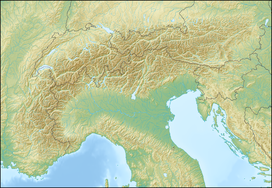Razor (2,601 metres or 8,533 feet) is a pyramidal mountain in the Julian Alps and the sixth-highest mountain in Slovenia. First ascended by Otto Sendtner in 1842, it is now frequently ascended, with numerous mountain huts available for climbers.
| Razor | |
|---|---|
 | |
| Highest point | |
| Elevation | 2,601 m (8,533 ft)[1] |
| Prominence | 332 m (1,089 ft)[2] |
| Coordinates | 46°24′47″N 13°47′20″E / 46.41296°N 13.78901°E |
| Geography | |
| Location | Slovenia |
| Parent range | Julian Alps |
| Geology | |
| Mountain type | Pyramidal peak |
| Climbing | |
| First ascent | 1842, Otto Sendtner |
Location and description
editRazor is part of the Julian Alps in Slovenia, and is bordered by the Luknja and Vršič passes to the east and west, and the Krnica and Trenta valleys to the north and south. Together with its neighbouring mountain Prisojnik, it serves to connect Triglav and Jalovec. It is included in Triglav National Park and [3] is administratively part of Kranjska Gora.[4]
The mountain is located in a limestone karst region, with the Križ Plateau (Kriški podi) below it being a typical example. The area has been heavily shaped by erosion, caused by glaciation, rivers, and precipitation; as a result, it has many caves, sinkholes, and limestone pavements.[5]
Climate
editRazor is snow-covered from November to early June.[3]
| Climate data for Kredarica, Slovenia (station located at Triglav) | |||||||||||||
|---|---|---|---|---|---|---|---|---|---|---|---|---|---|
| Month | Jan | Feb | Mar | Apr | May | Jun | Jul | Aug | Sep | Oct | Nov | Dec | Year |
| Mean daily maximum °C (°F) | 1 (34) |
3 (37) |
8 (46) |
12 (54) |
17 (63) |
21 (70) |
22 (72) |
22 (72) |
18 (64) |
13 (55) |
6 (43) |
1 (34) |
12 (54) |
| Mean daily minimum °C (°F) | −5 (23) |
−4 (25) |
−1 (30) |
3 (37) |
8 (46) |
11 (52) |
12 (54) |
12 (54) |
8 (46) |
6 (43) |
1 (34) |
−4 (25) |
4 (39) |
| Source: Weather Underground[6] | |||||||||||||
Ascent
editRazor was first ascended in 1842 by botanist Otto Sendtner. Since then, numerous mountaineers have ascended the mountain. The more challenging routes are located on the mountain's northern and western faces (1,200 and 900 metres (3,900 and 3,000 ft) high respectively) and have via ferrata sections, while the southern and eastern (600 metres (2,000 ft)) faces are considered non-technical ascents. The most common routes are from the west, south, and east.[3]
Although Razor can be ascended year-round, its ascent is easier between mid June to October. At other times, the snowy conditions call for specialized equipment. There are six mountain huts on Razor, at heights ranging from 1,015 to 2,050 metres (3,330 to 6,726 ft). The main hut is the Pogačnik Lodge on the Križ Plateau (Pogačnikov dom na Kriških podih), standing on its southern side. The climber and writer Julius Kugy gave Razor the nickname "The Royal of the Julian Alps".[3]
References
edit- Footnotes
- ^ Carey & Clark 2005, p. 219.
- ^ "Razor - peakbagger". peakbagger.com. Retrieved 13 February 2015.
- ^ a b c d Velebit 2006, Razor.
- ^ Geography.org, Razor : Slovenia.
- ^ Carey & Clark 2009, p. 14.
- ^ Weather Underground, Seasonal Weather.
- Bibliography
- Carey, Justi; Clark, Roy (2005). The Julian Alps of Slovenia. Milnthorpe, England: Cicerone. ISBN 978-1-85284-438-7.
- Carey, Justi; Clark, Roy (2009). Trekking in Slovenia: The Slovene High Level Route. Milnthorpe, England: Cicerone. ISBN 978-1-85284-566-7.
- "Razor". Peakery.org. Retrieved 11 September 2011.
- "Razor: Slovenia". Geography.org. Retrieved 11 September 2011.
- "Seasonal Weather Averages". Weather Underground. Retrieved 11 September 2011.
- Velebit (10 July 2006). "Razor". summitpost.org. Retrieved 11 September 2011.
External links
edit- Media related to Razor (mountain) at Wikimedia Commons
